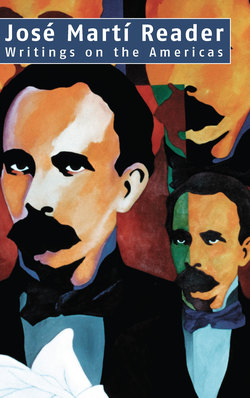Читать книгу José Martí Reader - José Martí - Страница 7
На сайте Литреса книга снята с продажи.
ОглавлениеPreface
Why publish a new collection of the writings, letters and verse of José Martí more than 100 years after his death in the Cuban War of Independence?
“Martí was the guide of his time but also stands as the anticipator of ours,” wrote Cuban revolutionary leader Carlos Rafael Rodríguez. Martí was an outstanding teacher, journalist, poet and revolutionary of his time, able to interweave the threads of Latin American culture and history. In his brilliant writings and impassioned speeches, he was able to capture and ignite the spirit of the Americas.
Committed to the task of completing “the poem of 1810” — the independence of Latin America from Spanish rule — Martí also saw a specter haunting the continent: the North American “monster.” He feared that the growing economic dominance of the United States would soon lead to political domination. He insisted that “Cuba must be free of the United States, as well as Spain.”
“I have lived inside the monster and I know its entrails,” Martí wrote to his old friend Manuel Mercado, the day before his death fighting for Cuba’s independence in 1895.
A fierce Cuban patriot, Martí also felt himself to be a citizen of all nations, as expressed in the first poem in Simple Verses which has become known as the words of Cuba’s most popular song: “Guantánamera,”
I am a traveler to all parts,
And a newcomer to none.
It could be said that this sense of Cuba’s place in the world and its spirit of international solidarity, evident in Martí, has also been a feature of revolutionary Cuba in the 20th century.
The 1959 Cuban revolution took place in a very different world from Martí’s, yet Fidel Castro always insisted on the continuity of the Cuban struggle for sovereignty from the first declaration of independence at Yara, October 10, 1868. A reading of Martí sheds much light on the roots and ideology of the Cuban revolution of 1959, as well as the political and moral inspiration guiding Fidel Castro and the other young Cubans who, calling themselves the Centennial Youth, launched the bold attack on the Moncada Barracks on July 26, 1953, the year of the 100th anniversary of Martí’s birth. This was no whim or artifice.
In particular, Martí’s writings make clear that the tumultuous US-Cuba relationship cannot be explained simply as a Cold War construct, but has a much longer and more complex history.
Martí’s vision went beyond simply an independent Cuban republic to encompass a “fundamental transformation of Cuban society,” which meant “a radical restructuring of the economic, social and political spheres, based not on ideology but on a moral transformation of what can be termed the human dimension of patria [homeland].”1 Martí himself observed: “It is a case of changing a nation’s soul, their entire way of thinking and acting, and not just their external clothes.”
It has been said that the complexity of Martí’s thought can mean many things to many people. Yet there are obvious, constant ideas running through all his writings: his egalitarian spirit, his profound belief in the human dignity of all peoples, his sincere rejection of racism, his absolute humility and denial of self, and his deep commitment to “the poor of the earth” with whom he wished to “throw [his] luck.”
Above all, Martí’s pleas on behalf of the peoples of Latin America, in this age of globalization and new forms of colonization, give his voice a remarkably modern resonance and an obvious relevance to the political and philosophical debates of the 21st century.
On the 100th anniversary of Martí’s death, Fidel Castro summed up the man who has often been referred to as the “Apostle”: “Martí was a universal man with extraordinary ideas.”
Martí’s complex literary style is difficult to translate satisfactorily into English. As one biographer remarked, “the romantic exuberance of his prose seems rather heady to readers brought up in a more sober tradition.”2 The publishers wish to acknowledge the valiant efforts of the team of translators who worked on this project.
The collaboration of both the Centro de Estudios Martianos and Editorial José Martí in Havana was essential to the initiation and completion of this new selection of Martí’s writings. Our thanks also to Iván Pérez Carrión, José Amieva Dalboys, Jorge Fernández Paz and Jim Shnookal; to Elinor Randall, Mary Todd, Manuel Tellechea and Carmen González Díaz de Villegas for their translations; and Ivan Schulman for his introduction.
Finally, my coeditor Mirta Muñiz must be acknowledged for the considerable amount of work she did in order to bring this project to fruition.
Deborah Shnookal
